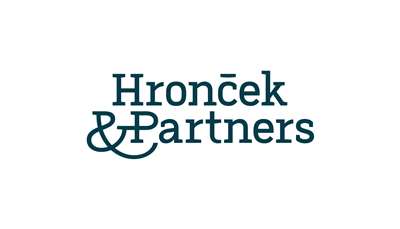Interview with Viktor Feťko, crypto asset expert at the law firm Hronček & Partners, s. r. o. Viktor is one of the leaders of the AllAboutNFT project, a unique concept that is unlike anything else on the market. This asset (NFT) is becoming increasingly important not only for investors and collectors, but also for content creators, thanks to the growing popularity of blockchain technology and cryptocurrencies. How can artists benefit from this and what do they need to consider if they want to use NFTs to finance their projects? Find out more in the interview.

Hi Viktor, we're glad you found time for us in your busy schedule. We hope you're ready for our questions.
Introductory question... What does NFT bring us?
There are different perspectives on NFTs. Some people perceive or imagine it as a specific image where they right-click on the image, select "Save as" and then download the image to their storage without having to buy it. I respond to such opinions in the same way as I do to football cards or postage stamps from philatelists, or other such collectors or collectibles. I use Pokémon cards as an example: I can copy each one using a color copier and have the image in physical form—I can store it in a drawer or wherever I want and do basically what what a stamp collector or a football card collector does. So it's not about NFTs allowing someone to exclusively own digital content that someone else cannot perceive with their senses. It's more about someone having ownership rights. However, whether ownership rights can have any special rights pertaining only to specific digital content which actually opens up a new set of legal relationships and a new set of social relationships—in non-legal terms, the question of ownership of any digital content. This is something that, until recently, was not very popular, even though the concept has existed for many years. At that time, the market was not so saturated with distributed transaction database technology and NFTs as assets, but now, in a short period of time, with the popularization of blockchain, DLT (distributed ledger technology) and NFTs themselves, it has become more widely known and has a greater impact. This gives it a certain right to a digital asset, where the more people recognize it, the more value it has. So I see it as a new type of asset, a newly expanded type of asset that allows us to have rights to digital assets that were not previously possible.
NFTs, crypto, and blockchain technology in general, which you are also involved in both personally and professionally, are why you started the AllAboutNFT project at your law firm. What is this project? What is its purpose?
As I said, NFTs have been around for some time. In general, blockchain technology is almost as old as I am, but it has only become widespread in recent years, and awareness of what NFTs are and what they are about is only just beginning to grow. NFTs open up a wide range of legal relationships that could not be realized before NFTs entered the market, thus opening up opportunities for a large group of people. The most common are content creators who can realize their work in the form of NFTs, which can be one of their sources of income. For example, a musician has income from CD/vinyl sales, which is very small to minimal, and also has income from streaming platforms, concerts, merchandising, or other such items, and more recently, they may also have income from the sale of NFTs. If a content creator decides to make their content available via a streaming platform, the terms and conditions are clear. They accept the general terms and conditions of the platform and then receive some income from that. If I want to sell merchandise, it's clear: I have T-shirts or hoodies made, I sell them on a website under certain conditions, and I get paid for it. But if someone wants to issue an NFT, there are a lot of aspects to deal with—from technical aspects, such as how to issue an NFT, how to monetize it on which platform, how to tax the income from this NFT, what legal status it has, and so on. So there is an interdisciplinary overlap of issues that is not addressed in the public sphere, and NFT issuers do not have enough information to take full advantage of NFTs. The purpose of the AllAboutNFT project is precisely to provide answers in each of these necessary areas, so that anyone interested in the Visegrad Four countries or the European Union who wants to issue and monetize NFTs and thus support their work has all the answers they need in one place.
What can a law firm offer from this perspective?
As I mentioned, legal issues are one of the many questions that must be answered when creating, issuing, and selling NFTs. There are several interesting questions here. If I may mention a few examples, in the Slovak Republic, for example, crypto assets and NFTs are not considered property. The same is true in Poland, the Netherlands, and the Russian Federation. In the rest of Europe, crypto assets are intangible. Even things in quotation marks "intangible" are things in the legal sense. For example, such a small difference has far-reaching consequences in that we can now discuss whether I can conclude a purchase agreement. We can even discuss whether I can fulfill the elements of a criminal offense that presupposes that the subject of the offense is a thing, since a crypto asset is not a thing. Another issue is regulatory issues. We know that crypto assets are close to the financial market. NFTs are slightly removed from this market, but they are still very close to financial market regulation, and the question now is whether any activities related to NFTs meet the criteria for regulated activities on the financial market. This raises a lot of questions. Intellectual property is a separate category of legal issues that issuers and other persons who monetize NFTs must deal with if they want to have everything in order. However, it should be noted that these are not clear-cut answers, as many of these questions do not have clear answers and therefore a broad legal perspective is needed in this area. For example, if a problem arises with the sale of merchandise or at a concert or any other source of income for a content creator, the answers are relatively clear. They can be found on the internet, so you don't need to hire a law firm to find the answer to a purely legal question, even if you don't have a legal education. Due to the fact that many, many aspects of crypto assets and NFTs are not specifically regulated and that NFTs bring a new type of legal relationship that the legislator does not anticipate, there are many different gaps in legislation and court decision-making practice In order to resolve these issues correctly, a broader legal perspective is needed, which the internet cannot provide. A lawyer who does not have the broad legal perspective and scope of our law firm, unless they are an expert in this field, will not be able to provide comprehensive answers to various questions. and this is the main reason and benefit that our law firm has and can offer when it comes to NFTs and specifically the AllAboutNFT project.
You mentioned several things that the market is not familiar with, which means that it is still looking for answers. In everyday legal practice, there are usually some precedents, court rulings, or specific legal regulations where you can find answers to these problems. From what I know and have observed, NFTs are currently in a kind of limbo. How often do you encounter cases where there are no answers?
Yes, the question is probably aimed at whether I often encounter cases in practice where legal practice does not provide sufficient answers. Every lawyer encounters such cases, and under the Slovak Civil Code, which I consider to be more concise and which already has some flaws, such cases arise frequently and in relatively simple circumstances. We may be dealing with a neighbor dispute over any basic civil law issue, and there will be a constellation of circumstances that neither the law nor judicial practice can provide an answer to. This is common legal practice in Slovakia and in most countries around the world, but of course there are areas where such gaps are considerably wider. Many of these areas fall within the scope of our law firm's expertise, and we encounter them relatively often. When clients come to us with a business question and often have an innovative idea, planning to do something in a new way and with a new form of business, which may bring about various new types of relationships that the legislator did not have in mind and are therefore not covered by legislation, we are here to resolve the issue correctly. We must have an interdisciplinary view of the law from several legal fields to ensure that no other legal regulation conflicts with this new form of business or innovative approach or any innovative activity, and that this activity does not contravene any of its provisions.
So yes, this happens quite often in practice, and this is precisely our task and one of our strengths, I would say. We often deal with issues that have not been dealt with before, and without the broad scope that our law firm has, it would not even be possible to deal with them.
In that case, in which areas of law do you most often encounter such situations?
We can choose several areas. We focus on medical and pharmaceutical law, but financial market law, with the spread of blockchain technology, is giving rise to new legal relationships that have not been addressed and for which there is no legal regulation—in some EU member states there is, in others there is not. If an activity is regulated at the national level, it is usually regulated differently, and the European legislator responds to this. In the coming days, the final version of the regulation on markets in crypto-assets will be published, which is a regulation that regulates any activities related to crypto-assets. A specific issue is how cryptoassets are assessed under this regulation and what the exceptions are. When can NFTs fall under this regulation and when not? If an NFT does not fall within the scope of the regulation on markets in crypto assets (MiCA for short), what is its status and how is it treated? These are all questions that we will answer as part of our project. This is precisely the area where we most often encounter situations that the legislator could not have foreseen, because this aspect did not yet exist in society, and we as a law firm have to deal with it.
Thank you very much for the interview and we wish you every success.
You can read about the entire AllAboutNFT project at allaboutnft.eu.
